Keeping your diy dishwasher cleaner is essential for maintaining its efficiency and ensuring your dishes come out sparkling every time. Over time, food particles, grease, and soap residue can build up, leading to unpleasant odors and reduced performance. Understanding how to make homemade dishwasher cleaner can help in maintaining it properly and troubleshooting common issues that may arise over time.
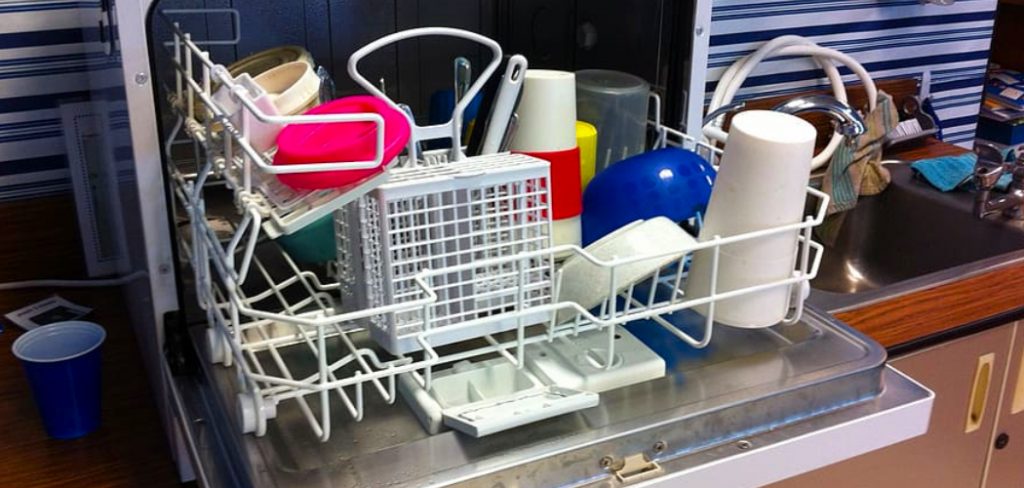
The Importance of a Clean Dishwasher
A clean dishwasher is crucial for several reasons. First, it ensures that your dishes, utensils, and cookware are thoroughly cleaned and sanitized with every cycle. Residue buildup inside the dishwasher can spread to your dishes, leaving them less hygienic than expected. Additionally, a clean dishwasher operates more efficiently, using less energy and water to complete each wash cycle. Keeping your dishwasher in good condition can also help prevent costly repairs by reducing the strain on its components. Finally, regular cleaning helps eliminate unpleasant odors, creating a fresher and more pleasant kitchen environment.
Ingredients You’ll Need
To make your own homemade dishwasher cleaner, you’ll need a few simple and affordable ingredients that are likely already in your home. Here’s what you’ll need:
- Baking Soda – A natural deodorizer and mild abrasive that helps remove grime and odors.
- White Vinegar – An effective natural cleaner that breaks down grease and soap scum.
- Lemon Juice (optional) – Adds extra cleaning power and a fresh, citrus scent.
- Coarse Salt (optional) – Provides additional scrubbing strength for stubborn buildup.
These ingredients work together to clean and refresh your dishwasher without the use of harsh chemicals.
10 Methods How to Make Homemade Dishwasher Cleaner
1. White Vinegar Rinse
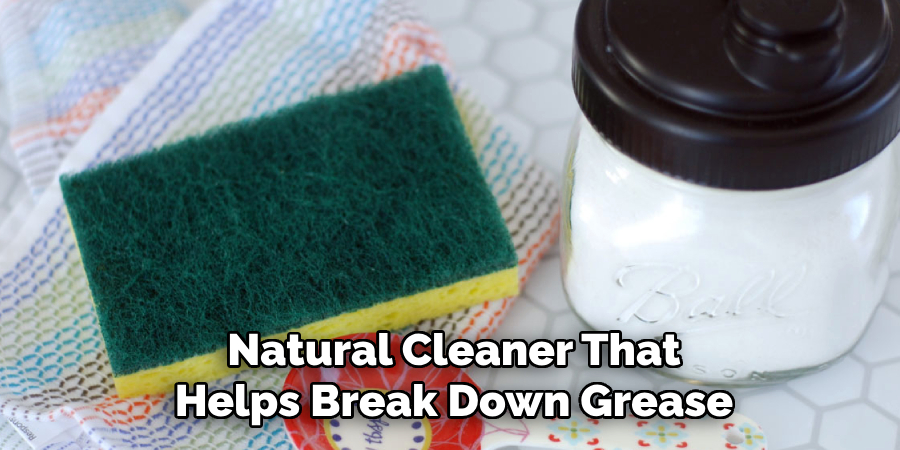
White vinegar is an excellent natural cleaner that helps break down grease, soap scum, and mineral deposits. To use this method, fill a dishwasher-safe bowl or cup with one to two cups of white vinegar and place it on the top rack of an empty dishwasher. Run a hot water cycle to allow the vinegar to circulate and dissolve buildup. This method is particularly effective for eliminating odors and removing stubborn residue.
2. Baking Soda Scrub
Baking soda is a gentle abrasive that helps lift grime and deodorize the dishwasher. After completing a vinegar rinse, sprinkle a cup of baking soda across the bottom of the dishwasher. Run a short hot water cycle to allow the baking soda to absorb odors and scrub away remaining debris. This method leaves your dishwasher smelling fresh and looking spotless.
3. Lemon Juice Cleaner
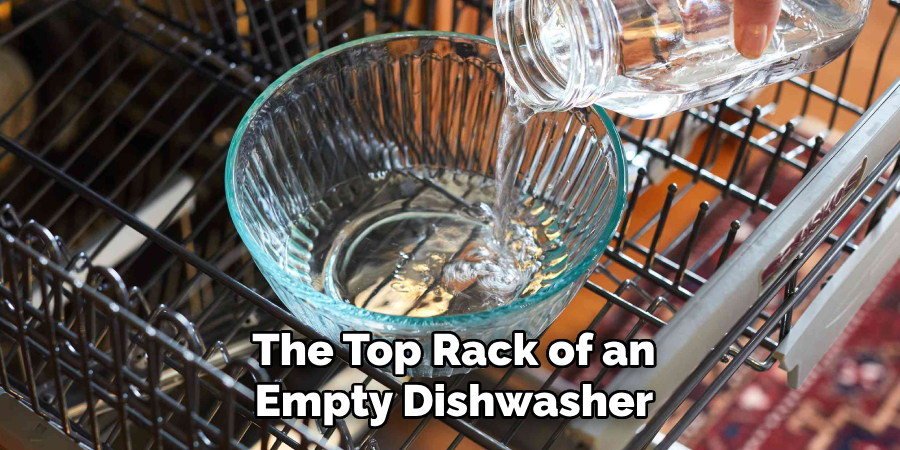
Lemon juice is a natural acid that works similarly to vinegar but with a pleasant citrus scent. Fill a dishwasher-safe bowl with one cup of lemon juice and place it on the top rack of an empty dishwasher. Run a hot water cycle to let the citric acid break down mineral deposits and grease while leaving behind a refreshing smell. This is an excellent alternative for those who dislike the strong scent of vinegar.
4. Salt and Baking Soda Mixture
For a deeper clean, combine one cup of baking soda with half a cup of coarse salt. Sprinkle the mixture on the bottom of the dishwasher and let it sit for about 15 minutes to absorb odors and loosen grime. Run a hot water cycle without detergent to flush away the buildup. The salt acts as a mild abrasive, enhancing the scrubbing action of baking soda.
5. Hydrogen Peroxide and Baking Soda Paste
If your dishwasher has stubborn stains or mold growth, a hydrogen peroxide and baking soda paste can be highly effective. Mix half a cup of baking soda with two to three tablespoons of hydrogen peroxide to create a thick paste. Apply the paste to the interior walls, rubber gasket, and around the door seals using a soft brush or cloth. Let it sit for 15 minutes before wiping away with a damp cloth. Then, run an empty rinse cycle to remove any residue.
6. Borax Dishwasher Cleaner
Borax is a powerful cleaner that helps break down grease, eliminate odors, and prevent hard water buildup. Sprinkle one cup of borax on the bottom of the dishwasher and run a hot water cycle without detergent. The borax dissolves and cleans the interior effectively, leaving your dishwasher fresh and free of grime.
7. Essential Oils for a Fresh Scent
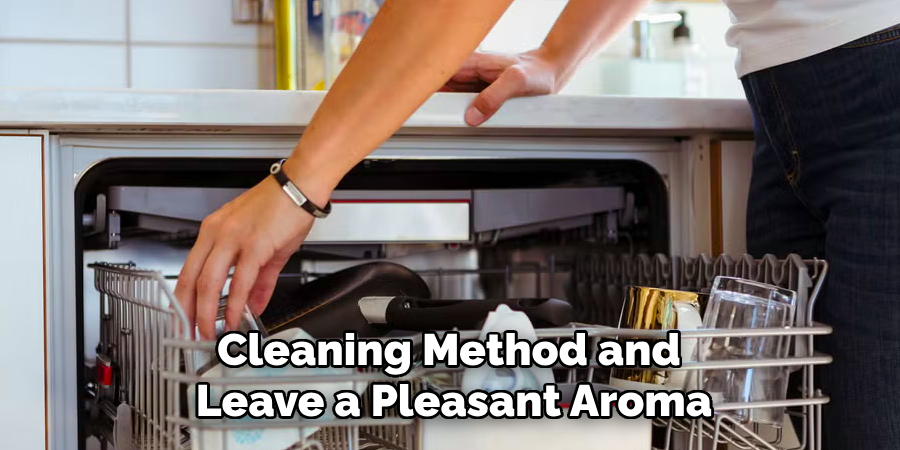
To enhance the effectiveness of any cleaning method and leave a pleasant aroma, add a few drops of essential oils such as lemon, tea tree, or lavender oil. Mix the essential oil with baking soda or vinegar before running a cleaning cycle. Tea tree oil is particularly beneficial for its antimicrobial properties, helping to prevent mold and bacteria growth inside the dishwasher.
8. Castile Soap and Vinegar Solution
For an all-natural, non-toxic dishwasher cleaner, mix one cup of white vinegar with a tablespoon of liquid Castile soap. Pour the mixture into the detergent compartment and run a hot water cycle. This method helps break down grease, remove soap residue, and leave your dishwasher sparkling clean without the use of harsh chemicals.
9. Dishwasher Cleaning Tabs with Natural Ingredients
Homemade dishwasher cleaning tabs are a great way to keep your appliance fresh with minimal effort. To make them, mix one cup of baking soda, half a cup of citric acid, half a cup of coarse salt, and a few drops of essential oil. Slowly add water until the mixture forms a damp, sand-like consistency. Press the mixture into an ice cube tray and let it dry overnight. Once hardened, store the tabs in an airtight container and use one per month by placing it in the bottom of an empty dishwasher before running a hot cycle.
10. Bleach for Mold and Mildew Removal
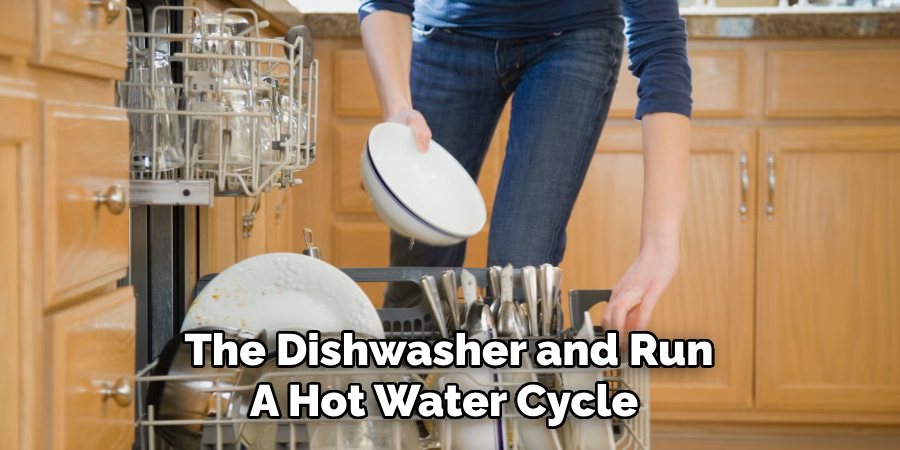
If your dishwasher has visible mold or mildew, bleach can help eliminate the problem. Add one cup of bleach to the bottom of the dishwasher and run a hot water cycle without detergent. Avoid using this method if your dishwasher has stainless steel interiors, as bleach can damage the finish. This method is highly effective for sanitizing and eliminating persistent mold growth.
Things to Consider When Cleaning Your Dishwasher
When cleaning your dishwasher, there are a few important factors to keep in mind to ensure the process is both effective and safe:
- Check the Manufacturer’s Guidelines – Always refer to the user manual for cleaning instructions specific to your dishwasher model. Some cleaning methods or ingredients, such as bleach, may not be suitable for certain interiors or components.
- Empty the Dishwasher – Ensure your dishwasher is completely empty before cleaning. Leftover dishes or utensils can obstruct the cleaning process or become damaged during a high-heat cycle.
- Inspect for Blockages – Before starting any cleaning method, check the dishwasher’s drain, spray arms, and filter for clogs or debris. Clearing these obstructions is essential for optimal cleaning performance.
- Avoid Overusing Abrasives – While abrasives like baking soda or salt can help scrub away grime, excessive or overly aggressive scrubbing may cause wear or scratches to the dishwasher’s interior.
- Ventilation and Safety – When using strong-smelling cleaners like vinegar or essential oils, ensure proper ventilation in your kitchen to prevent inhalation of fumes. Additionally, wear gloves when handling harsh substances like hydrogen peroxide or bleach.
- Test on Small Areas – Before applying new cleaning solutions to the entire dishwasher, test them on a small, inconspicuous section to ensure they don’t cause damage to the surfaces.
By following these considerations, you can maintain your dishwasher safely and prolong its efficiency, keeping it in top condition for years to come.
Safety Considerations
When cleaning your dishwasher, safety should always be a top priority to protect both yourself and your appliance. Here are some essential safety considerations:
- Use Protective Gear – Wear gloves to shield your hands from harsh chemicals like bleach, hydrogen peroxide, or cleaning solutions that can irritate your skin.
- Avoid Mixing Chemicals – Never combine cleaning agents such as vinegar and bleach, as this can produce harmful gases that are dangerous to inhale.
- Proper Ventilation – Ensure your kitchen is well-ventilated when using strong-smelling or chemical-based cleaners to avoid breathing in fumes.
- Handle Sharp Components Carefully – Dishwasher components like filters, spray arms, or interior corners can have sharp edges. Be cautious when removing or scrubbing these parts.
- Follow Recommended Amounts – Overusing cleaning agents may lead to residue buildup or potential damage to the appliance. Always use the quantities specified in your chosen method.
- Turn Off Your Dishwasher – Completely power off your dishwasher and ensure it’s disconnected from electricity if you need to manually clean internal components.
- Keep Cleaners Out of Reach – Store cleaning products and homemade mixtures securely, away from children and pets, to prevent accidental ingestion or exposure.
By adhering to these safety guidelines, you can clean your dishwasher effectively without compromising your health or the integrity of the appliance.
Conclusion
Keeping your dishwasher clean is essential for maintaining its efficiency and ensuring spotless dishes. With these ten homemade dishwasher cleaner methods, you can effectively remove grease, odors, and buildup using natural ingredients. Regular maintenance with these simple techniques will help extend the life of your dishwasher and keep it running at peak performance. Thanks for reading, and we hope this has given you some inspiration on how to make homemade dishwasher cleaner!
About the Author
Adrian Green is a passionate woodworking enthusiast who has dedicated his life to the craft of woodworking. From his early days working alongside his father in the family woodworking shop, Adrian has honed his skills and developed a deep love for creating beautiful, functional pieces with his hands. As the voice behind The Woodenify Blog, he shares his knowledge, tips, and inspiration with fellow woodworkers of all skill levels, helping them build confidence in their abilities while learning new techniques.
Professional Focus
- Specializes in DIY woodworking projects, from furniture making to home décor.
- Provides step-by-step guides, tips, and practical tutorials for woodworkers at any skill level.
- Focused on empowering readers with confidence and knowledge through easy-to-follow instructions and hands-on techniques.
- Passionate about building a community where makers can share, learn, and grow together in the world of woodworking.
Education History
University of Craft and Design – Bachelor of Fine Arts (BFA) in Woodworking and Furniture Design
Woodworking Apprenticeships – Gained extensive hands-on experience through various workshops and mentorships with seasoned craftsmen, refining carpentry and furniture-making skills.
Expertise
- DIY woodworking, carpentry, furniture making, and home décor projects.
- Creating clear, accessible tutorials and guides for beginner to advanced woodworkers.
- Helping readers experience the satisfaction and fulfillment of turning raw materials into stunning finished products.
